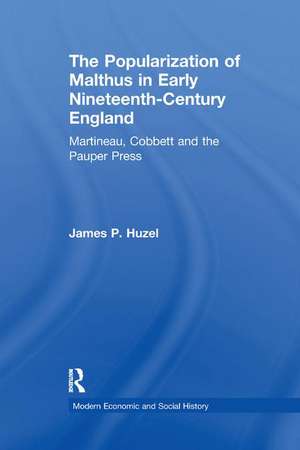The Popularization of Malthus in Early Nineteenth-Century England: Martineau, Cobbett and the Pauper Press: Modern Economic and Social History
Autor James P. Huzelen Limba Engleză Paperback – 27 feb 2017
| Toate formatele și edițiile | Preț | Express |
|---|---|---|
| Paperback (1) | 469.34 lei 6-8 săpt. | |
| Taylor & Francis – 27 feb 2017 | 469.34 lei 6-8 săpt. | |
| Hardback (1) | 1057.89 lei 6-8 săpt. | |
| Taylor & Francis – 20 mar 2006 | 1057.89 lei 6-8 săpt. |
Din seria Modern Economic and Social History
-
 Preț: 401.92 lei
Preț: 401.92 lei -
 Preț: 356.70 lei
Preț: 356.70 lei -
 Preț: 469.34 lei
Preț: 469.34 lei -
 Preț: 389.38 lei
Preț: 389.38 lei -
 Preț: 469.34 lei
Preț: 469.34 lei - 12%
 Preț: 342.59 lei
Preț: 342.59 lei -
 Preț: 469.34 lei
Preț: 469.34 lei -
 Preț: 489.26 lei
Preț: 489.26 lei -
 Preț: 469.34 lei
Preț: 469.34 lei -
 Preț: 469.34 lei
Preț: 469.34 lei - 15%
 Preț: 304.46 lei
Preț: 304.46 lei - 16%
 Preț: 301.72 lei
Preț: 301.72 lei - 16%
 Preț: 338.33 lei
Preț: 338.33 lei -
 Preț: 489.26 lei
Preț: 489.26 lei -
 Preț: 469.34 lei
Preț: 469.34 lei -
 Preț: 469.34 lei
Preț: 469.34 lei - 12%
 Preț: 299.52 lei
Preț: 299.52 lei - 17%
 Preț: 302.38 lei
Preț: 302.38 lei - 18%
 Preț: 299.52 lei
Preț: 299.52 lei
Preț: 469.34 lei
Nou
Puncte Express: 704
Preț estimativ în valută:
89.82€ • 93.43$ • 74.15£
89.82€ • 93.43$ • 74.15£
Carte tipărită la comandă
Livrare economică 14-28 aprilie
Preluare comenzi: 021 569.72.76
Specificații
ISBN-13: 9781138263024
ISBN-10: 1138263028
Pagini: 282
Dimensiuni: 156 x 234 x 15 mm
Greutate: 0.45 kg
Ediția:1
Editura: Taylor & Francis
Colecția Routledge
Seria Modern Economic and Social History
Locul publicării:Oxford, United Kingdom
ISBN-10: 1138263028
Pagini: 282
Dimensiuni: 156 x 234 x 15 mm
Greutate: 0.45 kg
Ediția:1
Editura: Taylor & Francis
Colecția Routledge
Seria Modern Economic and Social History
Locul publicării:Oxford, United Kingdom
Cuprins
Contents: Preface; Introduction: significance and agenda; Thomas Robert Malthus: overview of his life, thought and influence; Harriet Martineau: the female Malthusian?; Cobbett against the Parson; The radical working class press against the Malthusian crew; Conclusion; References; Index.
Notă biografică
Dr James P. Huzel is Assistant Professor Emeritus of History at The University of British Columbia, Canada.
Recenzii
'(an) admirable study ...Huzel has identified and filled a significant gap in the literature....with an excellent overview of Malthus's life and thought ....Each of the four chapters is painstakingly researched and documented; more than 1,000 endnotes in all provide sources and/or supplementary material to satisfy the most demanding reader. A short concluding chapter rounds off this outstanding effort of research and scholarship.' Economic History Review 'Huzel's valuable study brings to light with enormous care the early nineteenth century disputes between adherents of the moral economy and the market economy'. EH.NET
Descriere
The political economist Thomas Robert Malthus (1766-1834) first rose to prominence in 1798 with the publication of his Essay on the Principle of Population, in which he blamed rising levels of poverty on the inability of Britain's resources to support its growing population. Dealing with issues of social, economic and political history this work offers a fresh and insightful investigation into one of the most influential, though misunderstood, thinkers of the late eighteenth and early nineteenth centuries.













